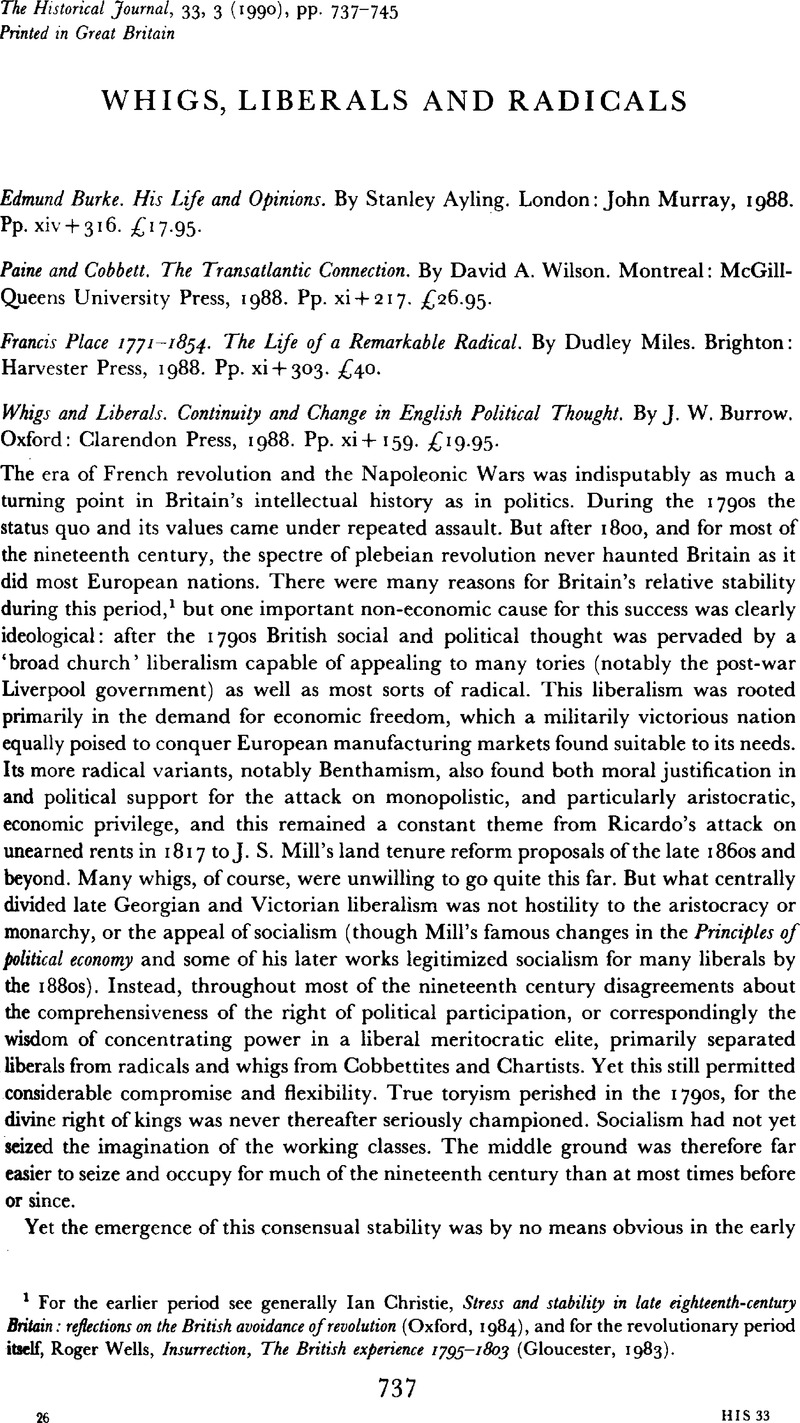No CrossRef data available.
Article contents
Whigs, Liberals and Radicals
Published online by Cambridge University Press: 11 February 2009
Abstract

- Type
- Review Articles
- Information
- Copyright
- Copyright © Cambridge University Press 1990
References
1 For the earlier, period see generally Christie, Ian, Stress and stability in late eighteenth-century Britain: reflections on the British avoidance of revolution (Oxford, 1984)Google Scholar, and for the revolutionary period itself, Wells, Roger, Insurrection, The British experience 1795–1803 (Gloucester, 1983)Google Scholar.
2 Two recent essay collections which examine this period are Britain and the French revolution, ed. Dickinson, H. T. (London, 1989)Google Scholar, and The French revolution and British culture, eds. Crossley, Cera and Small, Ian (Oxford, 1989)Google Scholar.
3 Kramnick, Isaac, The rage of Edmund Burke: portrait of an ambivalent conservative (New York, 1977)Google Scholar.
4 Also newly re-edited with an introduction, by J. G. A. Pocock, (New York, 1987).
5 E.g. Dreyer, Frederick, Burke's politics: a study in whig orthodoxy, (Waterloo, Ont., 1979)Google Scholar.
6 Still useful is O'Gorman's, FrankThe whig party and the French revolution, (London, 1967)Google Scholar.
7 One of the more recent shots fired in this controversy is Pocock's, J. G. A. ‘The varieties of whiggism from exclusion to reform’, in Virtue, commerce and history (Cambridge, 1985), pp. 215–310CrossRefGoogle Scholar.
8 See my Thomas Paine: social and political thought, (London, 1989), pp. 96–101Google Scholar. There are also useful comments on Paine's relations with Cobbett in Dyck, Ian, ‘Debts and liabilities: William Cobbett and Thomas Paine’ in Citizen of the world. Essays on Thomas Paine, ed. Dyck, (London, 1987), pp. 86–103Google Scholar.
9 This theme is extended in my Citizens and saints. Politics and anti-politics in early British socialism (Cambridge, 1989), pp. 152–61, 292–6Google Scholar. An older, treatment, of the later, nineteenth, century, is Pelling, Henry, America and the British left: from Bright to Bevan (Edinburgh, 1956)Google Scholar.
10 Wallas, Graham, The life of Francis Place 1771–1854 (London, 1898)Google Scholar.
11 The autobiography of Francis Place 1771–1854, ed. Thale, Mary (Cambridge, 1972)Google Scholar.
12 On Burke's early nineteenth-century reputation see Sack, James, ‘The memory of Burke and Pitt: English conservatism confronts its past, 1806–1829’, Historical Journal, XXX (1987), 623–40CrossRefGoogle Scholar.
13 Collini, Stefan, ‘The idea of “character” in Victorian political thought’, Transactions of the Royal Historical Society, XXXV (1985), 29–50Google Scholar.




